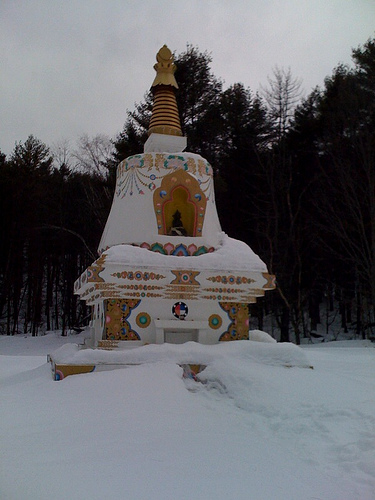My life was a mess. Even after all the healing work I had done, it still was a mess.
I wanted to take some drastic action. Two years prior, I ‘d been thinking about living at a particular Buddhist Retreat Center, Karme Choling, in Barnet, Vermont., but I hadn’t had the courage.
In l995, I took the risk. I made a verbal agreement with the head of human resources at Karme Choling that I would stay for six months, and then near the end of my tenure, I would decide if I wanted to stay longer.
It was too scary for me to make a two year commitment immediately and walk away from my comfort zone.
So six months it was. I gave notice at my successful job working in public relations. After all, I had just put a book on the New York Times Bestseller List for 63 weeks. I subletted my apartment in New York City for six months. Doing this, gave me space to come back to if I was too unhappy at the retreat center. It felt similar to when you first move in with a lover, but don’t quite want to give up your own home.
When I said my life was a mess, what I meant was: I had just ended my second marriage, had a series of affairs in between both, and felt I had not worked properly to transform all of the rage and anger within.
I realized I had hurt many people in my life, including my two sons and my two stepsons.
I yearned to be in a state of good mental health and to have positive people in my life. Some of my friends and family didn’t understand why I was leaving everything behind in NYC. It didn’t matter. I knew why I was doing it. My two sons drove me up to the Karme Choling in Vermont on a wintry day in January. It was a seven hour drive. They sat in the front and I sat in the back.
I felt so alone. On the trip up, no one said too much to one another, and I kept saying to myself, “what am I doing? Am I crazy living at a retreat center at my age? Am I crazy leaving my successful job and everyone in NYC?”
All this dialogue was going on in my head, while my sons spoke to one another in the front seat. I was frightened and scared. I had also taken photos of people who were dear to me so I could pin the photos up on my bedroom wall.
The silence in the car was as chilling as the winter air. I just had to sit with the fear.
By the time we got to Vermont, it was dark and I asked my sons if they wanted to see the center and stay for dinner. They said, “we will see the center and we will help you with your luggage, but we are driving right back to NYC.”
I knew the place gave them the creeps. Inside myself I wanted to go back with them, and the mantra: “Am I crazy for doing this?” kept rolling over and over in my mind.
It reminded me of when I was in labor with my oldest son, and the doctor informed my husband to leave because there was nothing more he could do. I watched from the labor room window, draped in a sheet, as my husband drove off. I felt so alone then and I felt so alone now. My sons and I hugged goodbye and I watched them drive off, and then they were gone. Inside I was screaming, “Take me back to NYC! Don’t leave me here all alone!”
I couldn’t sleep at all during the first night, so I got up early, got dressed and began walking around in the snow.
The retreat center was a converted New England farmhouse set on 400 rolling acres in the town of Barnet, three hours from Montreal, Canada. I felt like I was in another culture.
Just one step into any of the shrine rooms, and you were uplifted by the images of the Buddha’s, the gold leaf and the vibrant colors of blue, orange, red and green.
But I didn’t feel so uplifted. I wondered where I would fit in with all of this. The human resources director knew of my public relations skills and she assigned me to be the kitchen cook. I wasn’t happy about that and wondered how I would learn to cook for 60 people daily.
I felt utterly stupid, insecure and clumsy. Me, a top publicity person in NYC, working as a cook in the kitchen.
Now, looking back on the experience, I realize that once again I wanted to be put into a situation that would take away my comfort zone, so I could show myself I could do anything if I put my mind to it. I no longer counted on a “title” as a credential of who I was.
The residents included families, babies and a few elderly practitioners. The culture was mainly American, but spanned African Americans, people from Puerto Rico, The Dominican Republic and Scotland. Like a family, some of the residents I loved, some I hated and some I didn’t really care about.
There was no radio or television.
No worrying about clothes — we would either get them from a donation box in our laundry room or share with one another. We had three meals a day, plus a tea snack. I slept in a dorm, but if you were head of department you were given your own room.
Here I was, giving up my own apartment in NYC, sleeping in a dorm with four other women. Yuck!
I drove one of my roommates crazy. I liked to have the window open when I slept at night and she liked to have it closed. I would usually go to sleep before her, open the windowand in the morning the window would be closed.
This went on for weeks until I was given the choice of having a bed next to the window. One night I went to bed and was awakened around midnight by someone jumping around in the dark, muttering angry thoughts.
I watched the woman carrying on for a few seconds, and then said, “Look, I’m having as hard a time with this as you, and I will close the window for now, so let’s get some sleep and talk about it in the morning.” We eventually worked something out and then I got my own room. Thank you Buddha!
This was a small example of a shifting sea of change…people coming and going…living with the same 60 people every day.
Another experience was working in the kitchen with the head cook who had a temper. He was scary when he exploded. One particular day he screamed at me saying, “why the f*ck didn’t you do what I told you to do!”
I stood there, listened to him and then walked away. A few minutes later I came back into the kitchen and I said to him: “In the beginning your temper scared the sh*t out of me, and I wanted to f*cking kill you, but I’m no longer intimidated by your outbursts.” I was relieved I could speak up to him, and I think he was relieved that I was no longer afraid of him.
Chogyam Trungpa, a Tibetan Buddhist teacher, created this environment 50 years ago. He always said, “You couldn’t help others unless you had helped yourself.”
Another reason I came to Karme Choling was to learn about Buddhism, the philosophy and sit in meditation as much as I could, so I could calm down my mind.
Sometimes in the morning, I would practice meditation for four hours. I would sit on a cushion; close to the ground, with my legs crossed and hands lightly resting on my thighs. Sitting 4 hours a day can get very boring. The same thought patterns keep coming up over and over. I actually would watch my mind and sometimes it wasn’t pretty. Many times I would create sexual fantasies about a guy sitting near me or guys that had been in my life. Sometimes I would fall asleep, other times I would feel at peace, and sometimes I would keep jumping up from my cushion to go to the bathroom. Sometimes doing anything to get through the hours of sitting. Eventually my mind did become much calmer.
Another practice I would do in meditation was called Tonglen, which means exchanging oneself for others. The essence of the practice is inhaling the pain of a person as the color black, even someone you were angry at, and then exhaling white light to relieve their suffering.
Believe me, there were many days I struggled through this practice, not wanting to care about anyone except myself.
What I began to realize from doing this practice was not to lash out at others in order to make them feel the pain that I was experiencing. It was important to sit with my feelings and allow them to pass.
It was also important to speak when I was upset without wanting to annihilate the other person.
I had grownup with a mother and sister who were annihilators and would beat me to a pulp if I didn’t do what they said. I also discovered that by sitting with whatever was going on, I was able to feel a sense of peace and calm within my being. This was something I had never experienced in the past.
Sometimes that four hours would move so quickly that I was completely shocked when it was over.
One of my happiest recollections was a moment in the kitchen, just before the Tibetan New Year, that we Buddhists call “Shambhala Day.” The head cook brought in some Klezmer music, which is traditional Jewish folk music. We had received permission to play it in the kitchen while preparing for the holiday.
When the music began to play, I began singing, “Hava Nageela, Hava Nageela,” while dancing. The next thing I knew, the whole staff was dancing! Children and other residents were coming into the kitchen to join us. It truly was joyous and brought such delight to the children.
I can still see their amazed expressions as they watched us laughing, singing and dancing in the kitchen. I was beginning to see that I had the capacity to celebrate life daily.
Another delightful experience was baby-sitting in the main shrine room. There I would be sitting on the floor with this delicious, soft, cuddly, newborn baby in my arms, whispering into the his ear, “I love you sweet baby.” I looked down at the baby, or I would look around at the other people in the shrine room, or just look up at the giant pictures of the Buddha and I felt so grateful to be alive.
__________________________________________________________________________________________________________________
Sherri Rosen is now living in Harlem, New York. She has had her own publicity business for 12 years giving a powerful voice to people who are doing good things in the world. She writes on her own blog at www.SherriRosen.Com, and www.GatekeepersPost, www.Triiibes.Com, www.Examiner.Com, and www.TheGoodMenProject.Com















Read 5 comments and reply